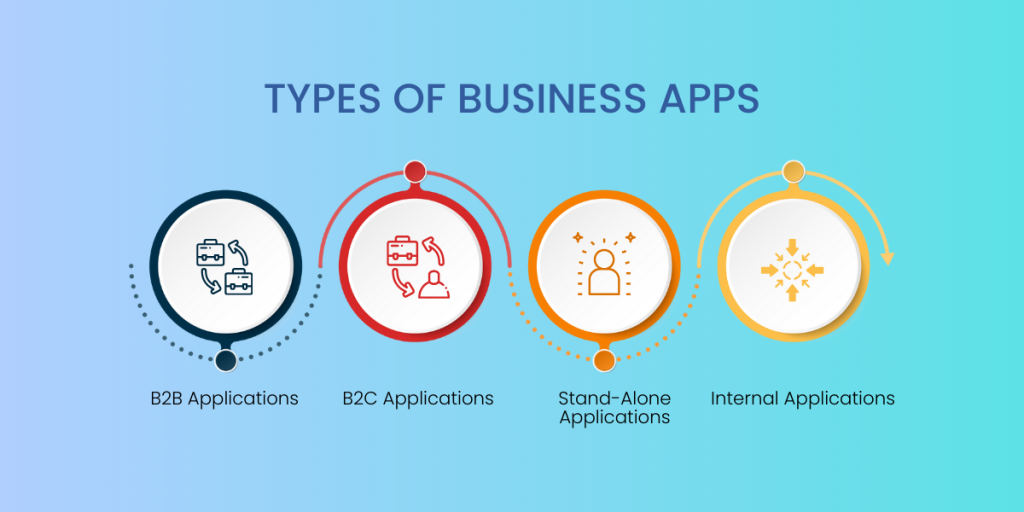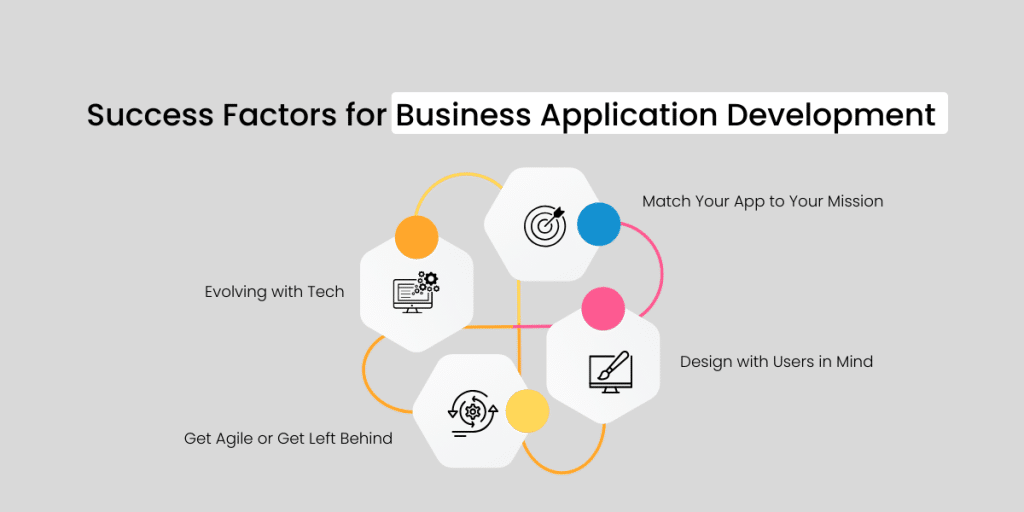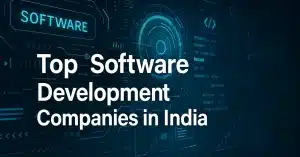Business Application Development: The Shortcut to Smarter Success
The art of crafting a successful business lies in creating the right solutions. Whether it’s a simple tool to track data or a comprehensive enterprise system that integrates everything, these apps are built to solve specific challenges. The ultimate goal remains the same: to make your operations smoother, faster, and ready for anything! Business app development ensures that, with continuous updates and improvements, your apps evolve to better meet your needs.
Different Types of Business Apps
Everyone is looking to improve their relationship with other businesses and wants to surely enhance internal productivity, custom software development has got you fully covered, don’t worry!
And since there’s no one-size-fits-all, the world of business apps is diverse, and each type serves a unique purpose to keep your operations running smoothly.
Let’s dive into the different categories of business application programming:

B2B Applications: Powering Business Connections
B2B applications are behind-the-scenes masterminds that make business partnerships seamless, where interactions between companies are smooth and secure. Whether you are connecting with suppliers or managing distributor relationships, these business apps can handle transactions, streamline procurement and your supply chain runs like a well-crafted instrument. Thus, they integrate complex systems as if it’s no big deal—think aligning with partners’ procurement processes or making bulk orders easier than ever. It’s the digital handshake that gets the job done with precision!
B2C Applications: Connecting with Customers
On the flip side, B2C applications bridge the gap between your business and its customers, offering an effortless and personalized experience. From e-commerce platforms like Shopify to loyalty apps that reward every click, these apps keep customers happy and businesses thriving.
Also Read : Fueling Business Transformation with Adaptive Software Development
Application development here ensures that shopping becomes a fun experience—from smooth checkout process or tracking your order like a pro. Loyalty apps further elevates the game by rewarding customers and making them feel valued, turning every transaction into an opportunity for relationship-building.
Stand-Alone Applications: Beyond the Business
Not all business development apps are about business-to-business or business-to-consumer. Some apps stand alone, designed to entertain, assist or streamline daily life. These include productivity tools, social media platforms or even games that help users stay organized. While not always business-critical, they still showcase the power of business apps development to influence our daily routines.
Internal Applications: Fueling the Workforce
Finally, we have internal applications, these apps work behind the scenes to improve employee productivity and workflow. From Human Resource Information Systems (HRIS) for managing employees to Inventory Control Systems that ensure your stock is always in check, business apps are designed to keep everything running efficiently. Tools like Slack or Microsoft Teams enhance communication, while Accounting Software helps track your finances. The real power lies in making everyday business operations easier and more efficient with business application programming.
Building Success, One App at a Time
Simplify Tasks with Automation
Imagine a world where repetitive tasks and manual processes no longer eat up valuable time and that’s what business applications do. The digital solutions step in to automate everything from data entry to inventory management, order processing, and even customer interactions. With automation taking over the mundane, businesses can say goodbye to human errors and inefficiencies!
Sync Your Systems
There is no need to worry about system integration while embracing any app development. Because when a new custom-built business app is introduced into your organization, and instead of clashing with your existing systems, it integrates effortlessly. It can handle your legacy software, ERP, CRM, or third-party tools, this app seamlessly connects with all of them.
Bridge Systems with Precision
Access real-time data whenever you need it. With business application development, this becomes a reality. Tracking customer behavior, analyzing market trends, monitoring inventory levels, or assessing operational performance, the app does it all and instantly gather, analyze, and visualize data, giving decision-makers the insights they need to make informed, data-driven choices.
Also Read : 12 Best System Development Methodology
Scale and Adapt with Ease
Having a system that stretches to accommodate growth and contracts when needed and app development creates a flexible foundation that grows alongside your company as when your business expands, your systems evolve too. Adding new features, users, or integrations without causing disruption. Take cloud-based apps, for example, they offer elastic scalability, which implies that your business can effortlessly scale up or down depending on demand, traffic spikes, or seasonal shifts.
Guard Your Data with Cyber Armor
Business app programming treats security like a VIP guest. Yes, you got that right! Security is built in from start to finish but it’s about protecting every step of the app’s journey. And so, you get your apps equipped with encryption, secure user authentication, multi-factor authentication (MFA) and secure APIs showing that each layer acts as a shield to keep your data safe.
Teamwork Made Easy
Collaboration seems fun and easy with modern enterprise app solutions and custom business applications development. often includes collaborative features such as integrated messaging, file sharing, and task management. Wherever your team is, no matter where they are, collaborate and stay in sync with them. These tools break down communication barriers. Another advantage is real-time updates that keep everyone in the loop while also task tracking ensures no one misses a beat.
Next-Level Tech- Crafting the Future with Emerging Tools
| Emerging Technology | Key Details | Technical Implementation | Security Considerations |
|---|---|---|---|
| 1. AI and Machine Learning Integration | AI and ML enable adaptive, intelligent systems to make predictions and automate decision-making. | – Predictive analytics (neural networks)
– Natural language processing – Automated pattern recognition – Intelligent process automation |
– Ethical AI considerations
– Bias mitigation – Secure data handling |
| Technical Architecture | – Machine learning frameworks (TensorFlow, PyTorch)
– Cloud AI services (AWS SageMaker, Google Cloud AI) – Deep learning models for behavior prediction, anomaly detection, and decision support |
||
| 2. Blockchain for Secure Transactions | Blockchain provides decentralized, secure transactions and enhanced transparency. | – Smart contract development
– Enterprise blockchain platforms (Hyperledger Fabric) – Consensus algorithms |
– Cryptographic hash functions
– Public key infrastructure – Secure key management |
| Core Characteristics | – Distributed ledger technology
– Cryptographic security – Immutable transaction records – Decentralized consensus protocols |
||
| 3. Internet of Things (IoT) Connectivity | IoT enables real-time data collection and interactions between smart devices. | – Lightweight messaging protocols (MQTT)
– RESTful APIs – WebSocket real-time communication – Edge computing for low-latency processing |
– Device security
– Managing heterogeneous ecosystems – Handling massive data volumes |
| Key Implementation Components | – Device management platforms
– Real-time data streaming – Adaptive device authentication – Scalable microservices |
||
| 4. Advanced Analytics | Transforms data into business insights for better decision-making. | – Big data processing (Apache Spark)
– Data manipulation (Pandas) – Interactive visualizations (D3.js) – Advanced statistical modeling |
|
| Analytical Capabilities | – Predictive modeling
– Real-time data visualization – Machine learning-driven insights |
||
| 5. Microservices Architecture | Microservices enable flexible, modular, and scalable systems | – Containerization (Docker)
– Orchestration (Kubernetes) – Service discovery mechanisms – Event-driven communication – Circuit breaker patterns |
– Service boundaries and communication
– Data consistency – Fault tolerance |
| Architectural Principles | – Independently deployable components
– Horizontal scalability – Decoupled system design |
||
| Comprehensive Integration Strategy | – Robust security
– Scalable infrastructure – Cross-functional collaboration – Continuous learning and adaptation |
Critical Success Factors for Business Application Development

Match Your App to Your Mission
You wouldn’t start a road trip without knowing your destination, right? In business app development, this means aligning your app’s features and functions with your organization’s goals. Whether it’s improving customer engagement, streamlining operations, or automating workflows, the app should be purpose-built to support your strategic objectives. Technical Tip: This requires well-defined business requirements and regular alignment between stakeholders and developers to ensure the app stays on track.
Design with Users in Mind (No, Really)
The user is always the top priority. Building an app, adding features, and polishing the interface while keeping user centric designs. Achieving a user-friendly design involves applying solid UI/UX principles. It’s a process that starts with prototyping, followed by iterative user testing to ensure that the app works in the most natural way possible. As the app evolves, continual feedback from real users helps refine its design.
Get Agile or Get Left Behind
It’s all about staying ahead and adapting to changes without breaking a sweat. With Agile, teams can respond to shifting requirements as they arise, making sure they stay ahead of the game. To make the most of this approach, developers often turn to frameworks like Scrum or Kanban. These frameworks in business app development help break the work into smaller chunks, allowing teams to deliver updates incrementally.
Evolving with Tech
Technology is always on the move, and your app should not be lagging. It’s only a matter of time before it’s outpaced by the competition, but you can continue to keep up with emerging technologies like AI, machine learning, or blockchain, you can make sure your app stays relevant. To do so, embrace cloud-native technologies like microservices and serverless architecture, which offer scalability and flexibility for your app.
Final Thoughts
Business application development is the shortcut to achieving smarter success and with business app programming, your business is always in the fast lane, adapting and thriving. At Software Experts India, they offer a full menu of services to help you create apps that meet your unique needs. Ready to make your business smarter? You are just a click away!









